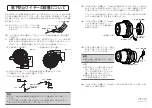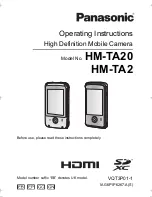
88
89
Reducing Red Eye
Red eye occurs in flash pictures when the flash reflects off the eye’s reti-
na. Although red eye cannot be totally prevented, it can be reduced by the
following methods:
• Take the picture in a well-lit place.
• When using a zoom lens, use the wide-angle end and a close distance.
• If you are using an external flash unit, keep it apart from the camera
lens as far as possible.
ADVANCED TECHNIQUES WITH THE BUILT-IN FLASH
This section explains how to calculate the built-in flash’s
effective range and the compatibility with F and FA lenses.
◆
Calculating the flash effective distance according to the
camera-to-subject distance.
Calculate the effective flash range as follows:
For far distances
Guide No. ÷ Current aperture
For near distances
Far distance result ÷ 5*
1
*1: This formula using “5” as the divider applies only to the built-in flash.
The flash cannot be used at distances shorter than 0.7 m. Doing so will
result in irregular or obstructed flash coverage and flash overexposure.
Memo
Memo
Memo
Memo
The Guide No. will be as follows depending on the ISO film
speed.
ISO Film Speed
Guide No.
ISO25
5.5
ISO50
7.8
ISO100
11
ISO200
15.6
ISO400
22
With ISO 100 film and an f/2.8 aperture, calculate the
effective flash range as follows:
For far distances
Guide No. 11 ÷ f/2.8 = approx. 3.9 m
For near distances
3.9÷5 = approx. 0.8
The effective flash range is therefore approx. 0.9 m - 4.3 m.
Calculating the flash aperture from the effective flash
range
Use the effective flash range to calculate the flash aperture as follows:
Guide No. ÷ flash range = Flash aperture
If the result is a number (such as 3) that is not a lens aperture value, set
it to the next smaller aperture value (2.8).
Memo
Memo
USING THE BUILT-IN FLASH
STEP UP
FLASH PHO
T
OGRAPHY
MZ-6(E)05 E1/085-094 11/8/02 12:06 PM Page 88
















































